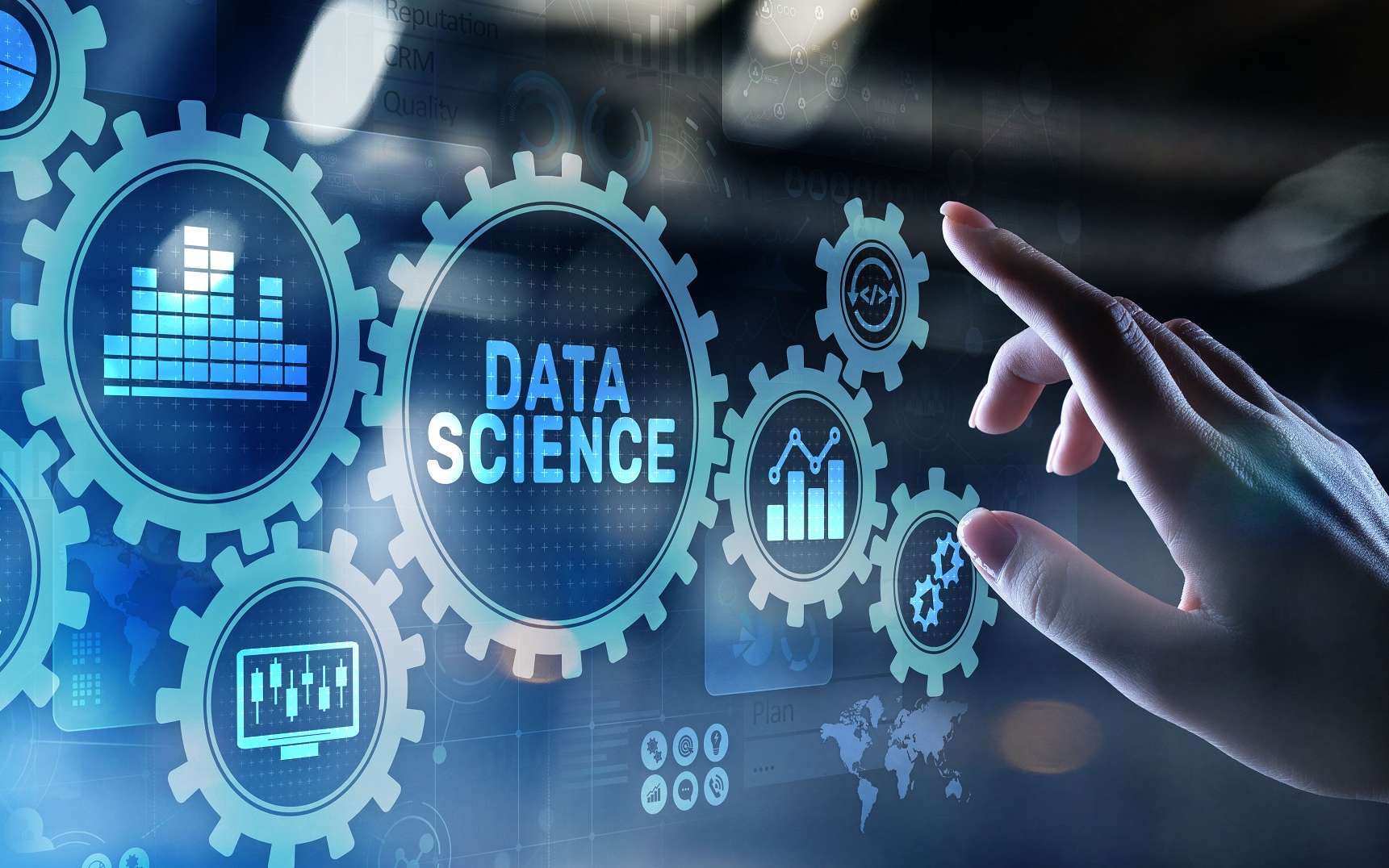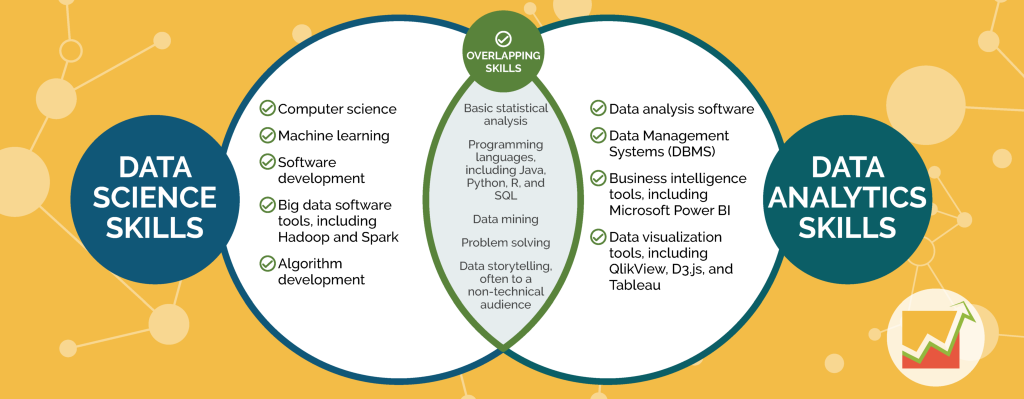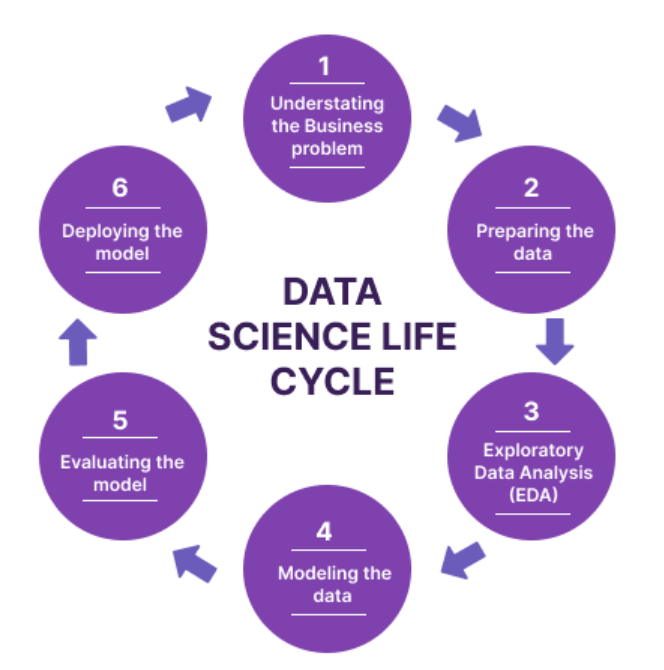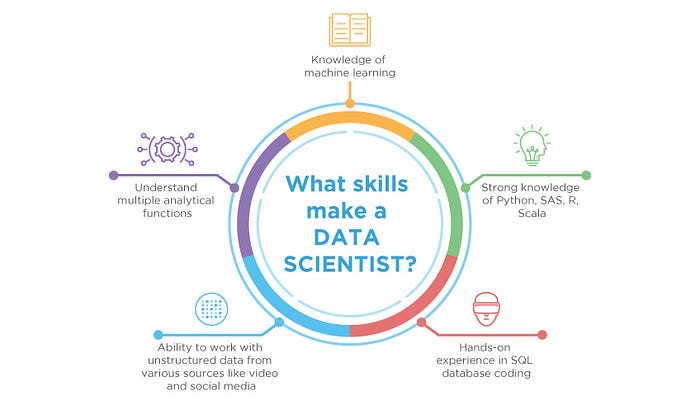Engineering has always been a field of innovation and evolution, offering exciting opportunities for those who choose it as a career path. As a fresh graduate or a college student,…

What is Data Science? – Explained in Simple Terms
In the digital age, data is often referred to as the ‘new oil’. It’s a precious resource that, when harnessed and analyzed effectively, can yield valuable insights, drive decision-making, and lead to transformative innovations. Data science is the discipline that empowers individuals to unlock the potential of this data.
In this comprehensive article, we will delve into the world of data science, covering its definition, historical evolution, applications, required skills, career opportunities, tools and technologies, certifications, and even provide sample projects for freshers and students. Whether you’re considering a career in data science or simply curious about this exciting field, read on to discover what makes data science so vital in today’s world.
Data Science Definition
In order to extract knowledge and insights from both organized and unstructured data, data science is an interdisciplinary profession that combines domain knowledge, programming abilities, and statistical competence. It is frequently distinguished by the data analysis and interpretation procedures, systems, algorithms, and methods that are used in science. Data science’s main objective is to transform data into useful insights, forecasts, and suggestions that guide well-informed decision-making.
Data science is a versatile discipline that spans across a wide range of applications. It includes, among other things, artificial intelligence, machine learning, data visualization, and analysis. Data science is crucial to many industries, including marketing, technology, finance, healthcare, and technology.
Who is a Data Scientist?
In today’s data-driven world, data scientists are the modern-day detectives, tasked with uncovering hidden patterns and insights from vast amounts of information. They are the ones who turn raw data into actionable knowledge, helping businesses make informed decisions, improve efficiency, and gain a competitive edge.
Data scientists require a combination of technical skills, domain expertise, and soft skills to excel in their roles. They perform a wide range of tasks, from collecting and cleaning data to analyzing and interpreting it. Data scientists also develop predictive models, build data visualizations, and communicate their findings to stakeholders.
Practicing Data Science Interview Questions from the start gives an edge to the candidate at a later stage.
Data Scientist vs. Data Analyst – What’s the Difference?
Data Scientist and Data Analyst roles involve working with data, but, there are some key distinctions. Data scientists focus on developing predictive models and solving complex problems using data-driven approaches. They have a strong background in statistics, machine learning, and artificial intelligence.

Whereas, Data analysts focus on collecting, cleaning, and analyzing data to extract insights. They have a strong understanding of data manipulation and visualization techniques.
Data Science Lifecycle
The data science lifecycle is a structured approach to transforming raw data into actionable insights and solutions. It encompasses a series of steps that guide data scientists through the process of understanding, preparing, modeling, evaluating, and deploying data-driven solutions.
The key stages of the Data Science Lifecycle are:
Business Understanding
This initial phase involves defining the business problem or opportunity that the data science project aims to address. It requires a clear understanding of the business objectives, stakeholders, and potential impacts of the project.
Data Understanding
In this stage, data scientists explore and gather data from various sources, including internal databases, external datasets, and real-time data streams. They assess the quality, relevance, and consistency of the collected data.
Data Preparation
Data preparation involves cleaning, transforming, and organizing the data to make it suitable for analysis. This may include handling missing values, removing outliers, and encoding categorical data.

Data Modeling
Data scientists apply statistical and machine learning techniques to build models that can predict outcomes or identify patterns in the data. They select appropriate algorithms, train the models, and evaluate their performance.
Model Evaluation
This stage involves assessing the performance of the trained models using various metrics, such as accuracy, precision, recall, and F1-score. They compare different models and select the one that best suits the business problem.
Model Deployment
The selected model is integrated into the business processes or applications to generate insights and drive decision-making. This phase involves deploying the model to production environments, monitoring its performance, and making adjustments as needed.
Communication and Interpretation
Data scientists effectively communicate their findings and insights to both technical and non-technical audiences. They explain complex data concepts in a clear and concise manner, using visuals and storytelling techniques.
Importance of Data Science
Data science plays a pivotal role in today’s world for several reasons:
- Data-Driven Decision-Making: Organizations use data science to make informed decisions, optimize operations, and develop effective strategies.
- Predictive Insights: Data science enables predictive modeling and forecasting, allowing businesses to anticipate trends and outcomes.
- Personalization: In the age of big data, data science is crucial for delivering personalized experiences to customers, whether in e-commerce, content recommendation, or social media.
- Risk Management: In finance and insurance, data science is used to assess and mitigate risks, improving the accuracy of underwriting and claims processing.
- Healthcare Advancements: In healthcare, data science aids in disease prediction, diagnosis, and personalized treatment plans.
- Improved Efficiency: Industries like manufacturing and logistics leverage data science for process optimization and resource allocation.
- Scientific Research: Data science accelerates scientific research by analyzing large datasets, leading to breakthroughs in genomics and climate science.
- Security and Fraud Detection: Data science helps identify anomalies and suspicious activities, enhancing security and fraud detection.
History of Data Science
Mathematicians and statisticians started creating methods for evaluating and interpreting data in the early 19th century, which is when data science first emerged. The statistician John Tukey did not, however, invent the phrase “data science” until the 1960s.
Data science underwent a radical transformation in the 1990s with the advent of artificial intelligence and machine learning. Data scientists are now able to create more complex algorithms and models because of these developments, which opens up new application areas for data science.
In recent years, the field of data science has continued to evolve exponentially, with the development of new tools, technologies, and techniques. Data science is now ubiquitous in various industries, from healthcare and finance to retail and manufacturing.
How to Get Started in Data Science?
If you’re interested in a career in data science, here are some steps to get started:
- Consider pursuing a bachelor’s degree in a related field like computer science, mathematics, or statistics. A master’s or Ph.D. can be advantageous for more specialized roles.
- There are numerous online courses and MOOCs (Massive Open Online Courses) that cover data science topics. Various online learning platforms offer a wide range of options.
- Apply your knowledge by working on data science projects. These can be personal projects, open-source contributions, or internships.
- Connect with professionals in the field through LinkedIn, online forums, and local data science meetups. Networking can help you learn from experienced data scientists and discover job opportunities.
- Consider earning certifications such as the Google Data Analytics Professional Certificate, IBM Data Science Professional Certificate, or Microsoft Certified: Data Analyst Associate.
- Showcase your projects and skills in a portfolio to demonstrate your capabilities to potential employers.
- Optimize your resume with industry-specific keywords, to make it ATS-friendly.
Applications of Data Science
Data science has become an indispensable tool across various industries, enabling innovative solutions and driving growth. Here are some key applications of data science:

- Data science is used in healthcare to forecast disease outbreaks, find new drugs, and diagnose patients. Wearable technology and electronic health records produce enormous volumes of data that may be examined to enhance patient care.
- Data science is used by the finance sector for consumer credit scoring, algorithmic trading, fraud detection, and risk assessment. Banks and other financial organizations can make wise judgments with the use of predictive models.
- E-commerce companies employ data science for customer segmentation, recommendation systems, and pricing optimization. This improves user experiences and drives sales.
- Data science is used in marketing to understand consumer behavior, optimize advertising campaigns, and measure the effectiveness of marketing strategies.
- In education, data science helps personalize learning experiences, predict student performance, and assess the effectiveness of teaching methods.
- Data science optimizes supply chain management, route planning, and fleet management, reducing costs and enhancing efficiency.
- Social media platforms leverage data science to curate content, target ads, and analyze user engagement to improve user satisfaction and ad revenue.
- In manufacturing, data science is used for quality control, predictive maintenance, and process optimization, leading to cost savings and increased productivity.
The applications of data science are diverse and continue to expand as technology advances.
Skills Required for Data Science
Becoming a proficient data scientist requires a combination of technical and soft skills. Here are the essential skills to excel in this field:
- Programming: Data scientists need to know programming languages such as Python or R to sort, analyze, and manage large amounts of data.
- Statistics and probability: Data scientists need to learn statistics and probability to write high-quality machine-learning models and algorithms.
- Data wrangling and database management: Data wrangling is the process of cleaning and organizing complex data sets to make them easier to access and analyze. Data scientists are expected to extract data from different sources transform it into a suitable format for query and analysis, and then load it into a data warehouse system.

- Machine learning and deep learning: Data scientists need to immerse themselves in machine learning and deep learning to build predictive models and algorithms.
- Data visualization: Data scientists need to be able to communicate their findings effectively through data visualization tools.
- Communication and teamwork: Data scientists need to work collaboratively with business analysts and data analysts to conduct analysis and communicate their findings with stakeholders.
Career Opportunities in Data Science
The field of data science offers a multitude of career opportunities, and demand for data scientists is continually growing. Here are some of the exciting career paths in data science:
- Data Analyst: Data analysts focus on interpreting data and providing actionable insights. They are responsible for data cleaning, visualization, and basic statistical analysis.
- Machine Learning Engineer: Machine learning engineers work on developing and deploying machine learning models. They create algorithms that can make predictions or automate decision-making.
- Data Engineer: Data engineers build and maintain the infrastructure for data generation and collection. They are responsible for data pipelines and data storage solutions.
- Business Intelligence Analyst: Business intelligence analysts concentrate on creating reports and dashboards to help organizations make informed decisions. They often work with business intelligence tools.
- Data Scientist: Data scientists are at the heart of data-driven decision-making. In data science jobs, data scientists analyze data, create predictive models, and provide actionable insights. Data scientists often work with a variety of tools and technologies to solve complex problems.
If you are planning to pursue a career as a data scientist, check your career and job readiness, with the help of the Firstnaukri Pathfinder assessment.
- Statistician: Statisticians focus on the analysis and interpretation of data using statistical methods. They play a crucial role in research and experimentation.
- Data Science Manager: Data science managers lead data science teams, ensuring that projects align with the organization’s goals and strategies.
- Research Scientist: In academia and research institutions, data science is used for groundbreaking discoveries in fields like biology, physics, and climate science.
Data Science Tools and Technologies
Data science relies on a diverse set of tools and technologies to process and analyze data. Some of the essential tools and technologies include:
- Python: Python is the most popular programming language for data science due to its extensive libraries, such as NumPy, pandas, and scikit-learn.
- R: R is another programming language well-suited for statistical analysis and data visualization.
- Jupyter Notebook: Jupyter Notebook is an open-source web application that allows you to create and share documents that contain live code, equations, visualizations, and narrative text.
- SQL: Structured Query Language is used for managing and querying databases, an essential skill for data analysis.
- Hadoop and Spark: Hadoop and Apache Spark are distributed data processing frameworks that enable the handling of large datasets.
- TensorFlow and PyTorch: These are popular libraries for deep learning and neural network development.
- Tableau and Power BI: These are powerful tools for data visualization and creating interactive dashboards.
- Docker and Kubernetes: Containerization technologies like Docker and Kubernetes are used for managing data science environments.
Data Science Certifications
Certifications can validate your skills and knowledge in data science. Some of the prominent data science certifications include:
Google Data Analytics Professional Certificate
This certificate program covers data analysis, data visualization, and data cleaning using Google Sheets, SQL, and Tableau.
IBM Data Science Professional Certificate
The IBM Data Science Professional Certificate includes courses on data analysis, machine learning, and data visualization, using Python and Jupyter notebooks.
Microsoft Certified: Data Analyst Associate
This certification focuses on data visualization, data modeling, and data analysis using Power BI and SQL.
Certified Analytics Professional (CAP)
The CAP certification is offered by INFORMS and covers a broad range of analytics topics, including data science.
Cloudera Certified Data Scientist
This certification is for those who work with big data and focus on machine learning and data analysis using Cloudera technologies.
Importance of Certifications in Data Science for Students
Certifications in Data Science have become increasingly important for students aiming to build a successful career in this field. While academic programs provide foundational knowledge, certifications offer practical, hands-on experience with industry-relevant tools and technologies such as Python, SQL, Tableau, and machine learning frameworks.
Certifications play a vital role in bridging the gap between theoretical knowledge and real-world application, equipping students with the practical skills needed to become job-ready and confident. They also enable learners to specialize in niche domains, such as data engineering, natural language processing, or artificial intelligence, helping them stand out during campus placements and internship opportunities.
Below is a testimonial from Pendyala Sai Charan, an aspiring data scientist currently pursuing his undergraduate studies at Malla Reddy College of Engineering, Secunderabad, sharing how data science certifications have impacted his learning journey.
“I’m Sai Charan, an aspiring data scientist currently pursuing my undergraduate studies. As I’ve navigated the evolving landscape of data science, one thing has become clear: certifications are more than just add-ons; they’re essential stepping stones. While college provides theoretical knowledge, certifications offer practical exposure and industry-ready skills. Here’s why I consider them crucial:
- They bridge the gap between academic learning and real-world applications.
- Platforms like Coursera, edX, and IBM offer hands-on projects that build technical depth.
- Certifications help you explore niche areas like NLP, machine learning, or cloud-based data science.
- Digital badges and certificates add credibility and visibility on platforms like LinkedIn.
In a competitive job market, certifications have helped me stand out by proving my commitment and competence.”
Data Science Projects For Freshers
Practical experience is vital in data science. Here are some sample data science projects that freshers can work on to build their skills:
- Predictive Analytics for Sales: Develop a model to predict future sales based on historical sales data. This project involves time series analysis and forecasting.
- Customer Churn Prediction: Create a machine learning model to predict customer churn for a subscription-based service. This project helps in understanding customer behavior and retention strategies.
- Sentiment Analysis on Social Media: Analyze social media data to understand public sentiment about a particular topic or product. This project utilizes natural language processing techniques.
- Image Classification: Build a deep learning model for image classification, such as identifying objects in images or detecting diseases in medical images.
- Movie Recommendation System: Develop a movie recommendation system based on user preferences and historical ratings. This project involves collaborative filtering and recommendation algorithms.
- Fraud Detection: Design a fraud detection model using machine learning to identify suspicious transactions in financial data.
- Health Data Analysis: Analyze healthcare data to predict disease outbreaks, evaluate the impact of interventions, or identify risk factors.
Conclusion
Data science is a dynamic and fast-evolving field that holds immense importance in today’s data-driven world. As we’ve explored in this comprehensive article, data science is not just a buzzword but a discipline that touches every aspect of our lives, from healthcare and finance to entertainment and transportation. By acquiring the essential skills and certifications, freshers and students can embark on a rewarding career in data science.
As the demand for data scientists continues to rise, the opportunities are boundless, and the potential for making a meaningful impact on society is limitless. Make a career in data science today!
Related Reads:
- Career Options After Engineering
- Career Opportunities in the IT Sector
- Software Development Engineer [SDE]
FAQs on Data Science
What is data science?
Data science is an interdisciplinary field that encompasses the collection, preparation, analysis, visualization, management, and interpretation of data. It utilizes scientific methods, processes, algorithms, and systems to extract knowledge and insights from data.
Who is a data scientist?
A data scientist is a professional who possesses the skills and expertise to apply data science principles to solve complex problems. They use their knowledge of statistics, machine learning, computer science, and domain expertise to extract insights from data and communicate them effectively to stakeholders.
What are the core skills of a data scientist?
Data scientists require a combination of technical skills, domain expertise, and soft skills. Key technical skills include programming languages such as Python, R, and SQL, statistical and mathematical concepts, machine learning and artificial intelligence techniques, and data visualization tools. Domain expertise involves understanding the specific industry or area in which the data is being applied. Soft skills include communication, problem-solving, creativity, and teamwork.
What are the career paths for data scientists?
Data scientists can pursue various career paths within the field. They can specialize in specific areas such as machine learning, artificial intelligence, data visualization, or data engineering. They can also move into leadership positions such as data science manager, data science director, or chief data scientist.
What are the salary expectations for data scientists?
Data scientists are among the highest-paid professionals in the tech industry. According to Glassdoor, the average salary for a data scientist in the United States is $116,000 per year. Salaries can vary depending on experience, location, and industry.
What are the best resources to learn data science?
There are numerous resources available for learning data science. Online courses offer comprehensive training in data science fundamentals. Books, blogs, and online communities provide valuable insights and practical tips.
What are the top tools and technologies used by data scientists?
Data scientists utilize a variety of tools and technologies to perform their tasks. Popular programming languages include Python, R, and SQL. Data visualization tools like Tableau and Power BI are used to create insightful graphs and charts. Machine learning frameworks like TensorFlow and scikit-learn are employed to build predictive models.
What are the most in-demand skills for data scientists in 2024?
In addition to core data science skills, employers are increasingly seeking data scientists with expertise in cloud computing, natural language processing, and deep learning. These areas are experiencing rapid growth and demand for skilled professionals.
Latest Posts
Top Skills in Resume For Freshers – 2026 Detailed Guide
Creating a compelling resume as a fresh graduate can be a daunting task, but it’s also your ticket to landing your dream job. One of the key elements that can…
Step-by-Step Guide: How to Become a Mechanical Engineer
Mechanical engineering stands as one of the most versatile and in-demand engineering disciplines globally, offering exciting career opportunities across diverse industries. For college students and recent graduates in India, understanding…
What is Upskilling? – Meaning, Benefits and Tips to Upskill
Being ahead of the curve is more crucial than ever in the ever-changing world of today. This requires ongoing skill development and technological adaptation. This entails upskilling or reskilling for…
Top 10 Do’s and Don’ts For Your First Job
Looking for a new job can be a daunting task, especially if you’re a fresher. There are so many factors to consider, from the type of job you want to…
Popular Posts
100+ Quantitative Aptitude Questions for Placement with Answers
Quantitative aptitude questions play a crucial role in campus placements, competitive exams, and entry-level job interviews. Whether you are preparing for your first job interview, an aptitude test for placement,…
How to Start an AI Career in India: Skills and Future of Work
Artificial Intelligence (AI) is revolutionizing industries worldwide. From automating routine tasks to enabling self-driving cars and intelligent healthcare diagnostics, AI is reshaping the future of work. For college students and…
How to Write Mail for Job Application – Explained
A job application email is a professional email that you send to a potential employer to express your interest in a job opening. It is typically accompanied by your resume…
Google Internship 2026 for Freshers: All You Need to Know
In the competitive landscape of technology careers, a Google internship stands out as a golden opportunity for aspiring professionals. Whether a college student or a recent graduate, securing an internship…
How to Write a Job Application Letter (With Samples)
When it comes to applying for your first job, making a great first impression is crucial. As a recent graduate, you might feel a little intimidated by the idea of…
